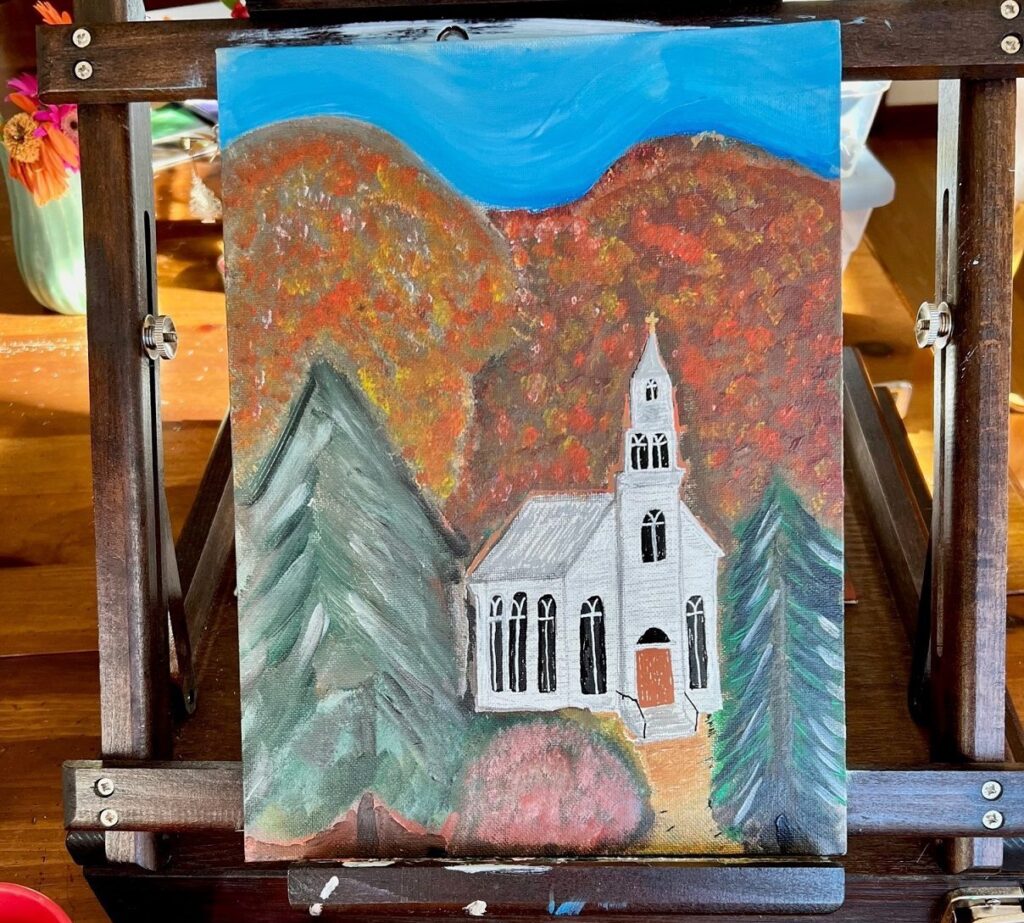
Learning
I awake early, around 5:00 am. After chasing the day’s first capsule of synthetic dopamine with the first cup of coffee, I sit in front of my easel.
Unexpectedly, I caught the painting bug a few months ago. I’d thought about trying to paint for many years but never got around to it. Perhaps what they say about Parkinson’s prompting you to become more creative and drawn to artistic pursuits is true. It certainly feels that way.
It also feels unnatural to think of myself as a painter. I am a person who paints, but not a painter. That feels aspirational at best. Nevertheless, as I have almost every morning since winter break began ten days earlier, I pull out my bins that store paint, brushes, canvases, and other supplies, ready to get to work.
Remembering
I stare at the images in front of me. A stately white church tucked deep into a colorful mountain hides most of the wide blue sky beyond it. No people have yet been added to this scene, and I don’t know if any will be. People are hard to paint.
Interpreting a painting can also pose a challenge, especially for one who painted it and particularly one that’s unfinished. I think an art history professor in college told me that. Or maybe it was a seminary professor. Still, this unfinished painting draws me into its world and into my memories. It evokes the Appalachian Mountains, where my parents used to live and my young daughters waded in streams of clear water and slippery rocks. It also evokes memories of churches in various places I have studied and lived, memories that mostly comfort me but also puzzle me.
The morning sunlight begins to pass through the tall windows in my makeshift studio, revealing additional unfinished places on the canvas. I’m learning how important light is for painting.
I begin to fill in places that need more attention and work. I add shadows and light, touch up places missed by previous brush strokes, and even add some colors on those mountains that represent distant flowers and leaves.
I’m surprised how it comes together.
Time falls away.
Hoping
My mind drifts to my friend Michael, himself a truly gifted painter, who died a few weeks earlier after a brave wrestling match with Parkinson’s. I wish I could tell him about my learning to paint and what it does for my soul.
I think of my friend Dean and his beautiful family. He continues to head a large company and deals with all the demands such work brings while navigating his own Parkinson’s road and raising young children. I wish I could see him more often.
I think of a close friend’s son who, daily, pushes through anxiety and addiction as he tries to figure out his life path, and I hope my friend and his wife know how much I care.
I dip the brush in paint to add some additional color and light.
My thoughts drift to my friend Elizabeth, who lives with her own neurological beast, multiple sclerosis, and who just lost her aging parents within a few days of one another. I hope she knows how important she is to me.
I then think of my friend Jim, who values appreciates things I value and appreciate, and with whom spending time and having conversations makes me a better person. I hope he knows how grateful I am for him.
Living
Perhaps paintings, like illness and loss, and friendship for that matter, are as evocative as they are revealing, as aspirational as much as achieved. So we keep painting. We keep getting up, taking our medicines, wrestling with our foes, and sitting or standing before a canvas—a story, a day, that is being created, brought into existence before our very eyes. The canvas may not be blank, but it nevertheless invites us to work on it, to add color and depth, objects and images, hopes and desires alongside its shadows and smudges, its smears and color clashes.
As we keep at it each day, we can be surprised by what we see and what becomes a part of the story.
Hearing my daughters talking to one another in the kitchen, I put my brush into the plastic cup of water beside my easel and take one last look at my painting.
Once again I think of my friend Michael, wishing I could show him my painting and ask what he sees.
__________
Allan Cole is Dean of the Steve Hicks School of Social Work at The University of Texas at Austin, where he also serves as the Bert Kruger Smith Centennial Professor in Social Work and, by courtesy, as Professor of Psychiatry and Behavioral Sciences at the Dell Medical School. Diagnosed with Parkinson’s in 2016, at the age of 48, he is the author or editor of more than a dozen books on a range of topics related to chronic illness, bereavement, anxiety, and spirituality. His latest books are Discerning the Way: Lessons from Parkinson’s Disease (Cascade), In the Care of Plenty: Poems (Resource Publications), and Counseling Persons with Parkinson’s Disease (Oxford University Press). Follow him on Twitter @allancoleut.
